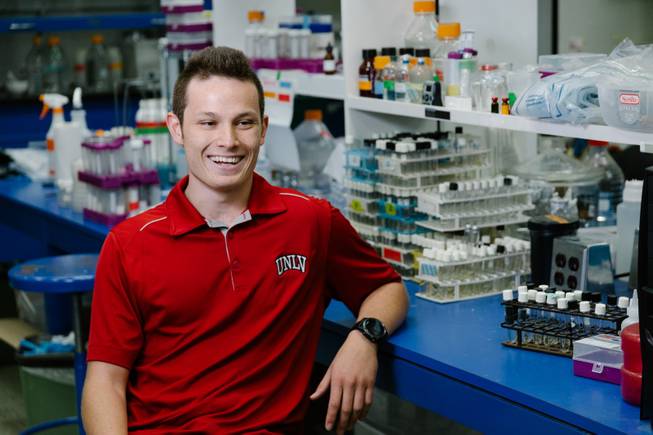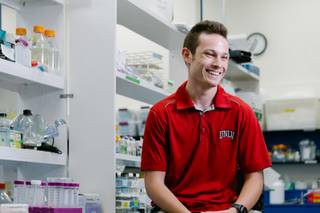
Wade Vandervort
Microbiology student Devon Payne, 20, discusses his studies and receiving the Goldwater Scholarship during an interview at the Life Sciences building at UNLV, Friday, May 5, 2017. The Goldwater Scholarship program is considered one of the premier awards for undergraduate STEM majors.
Tuesday, May 30, 2017 | 2 a.m.
Before he became UNLV’s first recipient in seven years of a prestigious national science scholarship, Las Vegas native Devon Payne was like most kids growing up — searching for their calling.
An avid video game player on the Nintendo 64, Payne also liked to fish, longboard and spend time with his labrador retriever, Murphy.
But most of all, Payne enjoyed science.
“I was always drawn to the science and nature books,” Payne said. “Everything from dinosaurs to astronomy to anatomy caught my attention. I liked reading textbooks over novels.”
Payne’s passion for science and work in professor Brian Hedlund’s microbiology lab at UNLV paved the way for his recent selection as a 2017 Goldwater Scholar, which is given to 240 university students each year. Payne, a 20-year-old junior, is the first UNLV student to earn the award — which comes with $7,500 for tuition — since 2010.
Earning the scholarship was challenging, Payne said, because the award requires applicants to submit a research proposal using only two pages. He applied for the scholarship last year, but wasn’t selected.
“I had pretty high expectations because we put a ton of work into it,” Payne said about his application, which took three months to put together. “It was some of the best writing I had done.”
While attaining the Goldwater Scholarship has been rewarding, the road there was equally as gratifying, he said.
During his senior year at Green Valley High School, he met Michael Bycraft, an environmental science teacher who Payne credits for helping him advance to where he is now. Bycraft, a geologist who now teaches in an international high school in South Korea, said he recognized Payne’s intelligence “almost immediately” and encouraged him to look beyond the classroom in developing his passion.
“He came in and sat right up front every day,” Bycraft said. “He was super inquisitive and he legitimately cared about the entire process, from collecting data to watching what happens in a lab and doing an experiment.
“But he was so smart that high school could get boring for him,” Bycraft added. “I showed him examples of people doing projects in Antarctica and China, and said ‘this could be you.’ Basically to illustrate that the field goes beyond studying in a lab all day.”
Bycraft connected Payne with Hedlund, a 13-year UNLV professor who heads a microbiology research lab on campus. Bycraft and Hedlund had just returned from a research trip to Shanghai, China, when Payne was enrolled in Bycraft’s high school class.
A year later, just after finishing his freshman year at UNLV, Payne was off to China himself, studying the relationship between clay and E. coli bacteria at the Chinese University of Geosciences in Beijing. The only UNLV student sent for the nine-week international research trip, Payne said his days would run from 5 a.m. to 11 p.m.
“It was mostly just me and the local Chinese students,” Payne said of the nine-week international research trip, which ended with an additional week of research in Shanghai. “I felt like as soon as I started picking up some of the Mandarin language, it was time to go back to the U.S.”
In Las Vegas, Payne’s projects include studies on growing bacteria and improving research of naturally occurring bacteria outside of a lab setting. Payne is listed as one of five contributors researching a bacterium found in Northern Nevada’s Great Boiling Springs. He works 15 to 20 hours a week during the semester on the project — during which he has maintained a 3.93 grade point average — and 40 hours a week over the summer.
“Devon has a unique combination of being very smart and having a great attitude,” Hedlund said. “He’s always smiling and happy and doesn’t get stressed out no matter what.”
The third of four children in his family, Payne is on pace to be the first of his siblings to graduate college and the first in his entire extended family to work in microbiology.
“I’m very, very proud,” said Payne’s mother, Cynthia Ashley. “He has always been buried in his books and pushing himself to reach new heights.”
With a graduation date set for summer 2018, Payne wants next to pursue his doctorate degree at a university in Montana, where he’s drawn by more fishing opportunity and outdoors life. Above all, the extra education will help him advance toward his goal of studying microbiology in nature for a career, and obtaining a title he has always wanted.
“I always liked the sound of “Doctor” before my name,” Payne said, grinning. “That would be cool.”


Join the Discussion:
Check this out for a full explanation of our conversion to the LiveFyre commenting system and instructions on how to sign up for an account.
Full comments policy